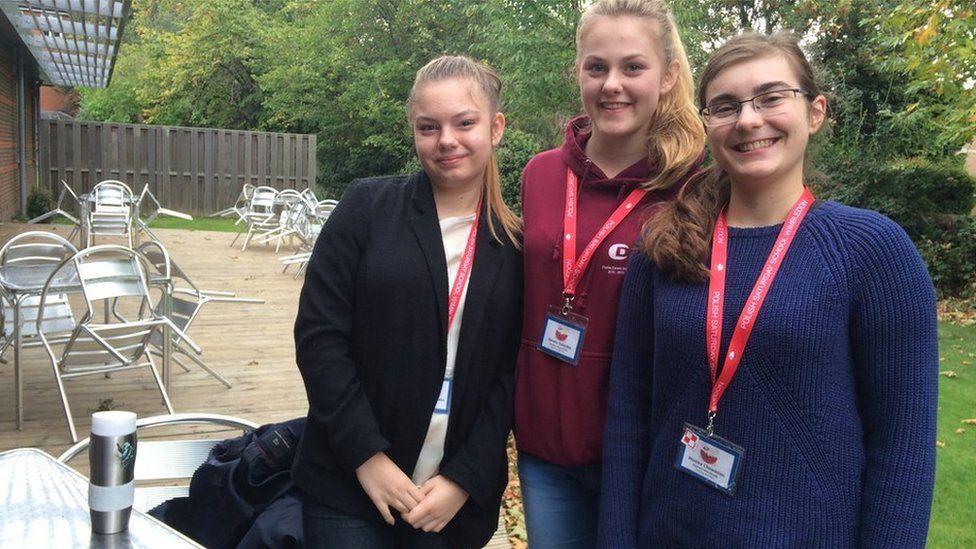Young, Polish and pondering a Brexit future
- Published

Born in Poland, brought up in Britain - how do the younger generation of Poles here feel Brexit will affect their future?
Natalia, who is 17, describes her parents as "typical" Polish migrants - her father works as a builder, her mother as a nanny. They moved here when she was a baby.
They have had to teach themselves English and haven't settled into British culture as thoroughly as she has, entirely educated in Britain.
Now, with reports of hate crimes against Poles, they worry about her and they are talking about going "home".
They have warned her not to speak Polish in public places and they are concerned if she goes out alone wearing her distinctive Polish scout uniform.
Natalia's not worried. "I've been here my whole life," she told me. "I feel at home here, I feel perfectly happy and fine, I've never had any problems in school before or after the Brexit vote."
Natalia and her friends Zuzanna and Monika, also 17, are all teaching assistants at the Polish school in Wimbledon, named after Marie Curie, where they used to be pupils.
Every Saturday, more than 500 children, aged from three to 17, spend the whole morning studying Polish language and literature, history and geography.
These supplementary schools were mostly set up after World War Two by servicemen and women of the Free Polish forces, determined to keep their culture alive in exile.
Now, they're packed with children of the later migrant wave, who want their children to be able to talk to their grandparents at home. For some, it is also to avoid becoming entirely British, to have choices in future.
The schools are busier than they've ever been. A new one has just been established in the name of the Polish 303 squadron that fought in the Battle of Britain, yet only a quarter of Polish children in the UK attend them.
Natalia, Monika and Zuzanna all plan to go on to further education in the UK. For now, they see their futures here.
But Zuzanna was stunned by the Brexit vote, that people didn't seem to recall the EU was founded to keep the peace after World War Two.
"It's a huge shock that people don't remember the past," she said, "that we Polish people actually helped England in the past, fighting against Germany, and we were ourselves the most vulnerable ones, taken away from the map, and people still target us."
None of the girls had been "targeted", in terms of abuse or worse, though Zuzanna said that just after the referendum, in the street, someone had stared very pointedly at her "Skola Polska" badge. She was uncomfortable.
None of the girls had changed their behaviour since the Brexit referendum, though.
All three are members of the Polish scouts: their uniform is recognisably Polish, they sometimes carry Polish flags.
Monika came to the UK at the age of six. "Honestly I've started wearing my uniform more," she said. "I think those people need to be silenced, their views need to be challenged and the only way to do that is if we actively challenge it."
Monika wants to go to medical school, and work in the NHS, which she admires.
Like some of the other teenagers I talked to, she is worried that it would be harder for her now to get into the university of her choice, that Poles may face discrimination, although she has applied for UK nationality.
No-one I met at the school was planning to return to Poland, though some had friends who had left.
One mother said: "When I came into work after the referendum, my colleagues said, 'Have you packed yet?' But it was a joke."
She said her family were settled - she had a good job, a mortgage, she was not worried about the falling pound.
But Izabela, a parent volunteer who has been in the UK for 13 years, said many people did not feel secure.
She thought the prime minister should make it clear Poles here were not at risk.
"I worry about my children," she said.
Those comments echo what the Polish Ambassador Arkady Rzegocki told the House of Lords this week.
"The post-Brexit status of European Union nationals, including Poles, living in the UK is far from clear," he said.
"These citizens need to know how and if their rights are protected to understand fully the implications of Brexit."
He noted concerns over a rise in reported "xenophobic" incidents and told the House of Lords committee that there were at least a million Poles in Britain, higher than the Office of National Statistics estimate of 830,000.
- Published13 October 2016
- Published31 August 2016
- Published4 September 2016